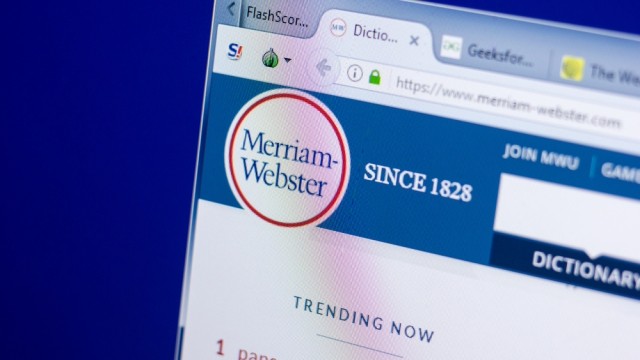For two decades, the "Word of the Year" has become a real-time reflection of what people are curious about and searching for in the Merriam-Webster online dictionary.
"For 400 years, dictionaries of English have existed, but it's only been since they've been online that we can measure that curiosity," said Merriam-Webster Editor-at-Large Peter Sokolowski.
The 2023 Word of the Year was revealed Monday morning as “authentic,” defined as “not false, being worthy of acceptance or belief as conforming to or based on fact.”
It can also mean “true to one’s own personality, spirit or character.” Although clearly a desirable quality, Merriam-Webster said it is hard to define and subject to debate, which are two reasons it sends many people to the dictionary.
Searches for the word “authentic” saw a substantial increase in 2023, driven by the emergence of artificial intelligence as well as celebrity culture and identity. With the line between what is “real” and what is “fake” becoming blurry, more people are trying to find authenticity in everything.
Last year the top word was "gaslighting"— a type of psychological manipulation. A runner-up was "oligarch,” as in the Russian ones facing sanctions. Searches for "codify,” to turn an idea into law, shot up 193% when the Supreme Court overturned Roe v. Wade last year.
The Word of the Year isn't just a word, said Sokolowski, it's a window on what's happening in the world.
"That's what we present to the public, to kind of give a report card on language, to say which words sent us to the dictionary in any given year. And also, we can connect that word with a particular story that might be from the news, it might be from entertainment, it might be from the weather," Sokolowski said.
Merriam-Webster started "Word of the Year" in 2003 when the war in Iraq and talk of "democracy" was in the news. In the midst of the 2008 financial crisis, the word was "bailout.” In 2020, the Word of the Year was "pandemic.” A year later, "vaccine.”
The first time Merriam-Webster noticed the way users queried the online dictionary after a major news event was in 1997, Sokolowski explained, which is when people searched about the death of Princess Diana.
"Notably the word 'paparazzi'," Sokolowski said. "That's really where we started to learn the way people use dictionaries."
Today, Merriam-Webster said more than 100 million searches every month prove that people still care very deeply about language.
"They pay attention to the language that is used in public, in the public sphere," Sokolowski said, "but they also pay attention to their own spelling. Words matter."
SEE MORE: The next front in the AI wars: The courtroom
Trending stories at Scrippsnews.com



